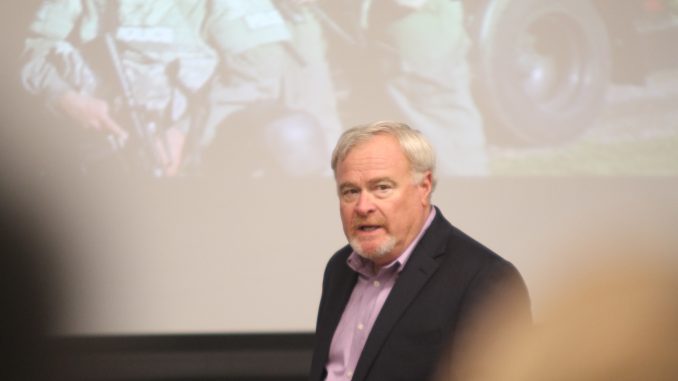
Gary Noesner said he got his start when he saw an episode of the Mickey Mouse Club that featured a segment about the Federal Bureau of Investigation. After that, he said joining the FBI was the “only dream” he ever had.
Noesner, now retired after 30 years as an investigator and negotiator, was the chief of the FBI’s Crisis Negotiation Unit for a decade. The Honors Program hosted a free lecture and a Q&A session between students and Noesner in Tuttleman Learning Center yesterday. He also discussed stories from his 2010 memoir “Stalling for Time: My Life as an FBI Hostage Negotiator.”
Brad Pearson, the assistant director of the Honors Program, grew up hearing first-hand stories about bank robberies, hostage situations and shootouts from Noesner, his friend’s father.
“I’d been a friend of the family and especially his kids my entire life,” Pearson said. “I knew what he did for a living and we always want people with interesting stories, so I just asked him, and here he is.”
Noesner said the skills he learned to use in volatile situations can actually be applied to situations in everyday life.
“Human conflict is a waste of energy and time,” Noesner said to the crowd in Tuttleman. “Even when I was young, I always tried to resolve things with my friends.”
As a negotiator, Noesner worked on famous negotiation situations, like the 26 days he spent in Waco, Texas where the FBI failed to resolve a standoff with a religious cult that resulted in the deaths of 75 people.
Three years later, Noesner was at another standoff in Montana. The Montana Freemen, a militia group, held the FBI in a negotiation for 81 days, during which not a single shot was fired and the militia group eventually surrendered.
Noesner also talked about the militarization of police and the lack of negotiation training in police departments. He said he once gave a lecture at a police department. Later that night, officers from his class convinced a woman not to commit suicide.
He told students that active listening was the base to creating rapport and trust. He said there is a “paradox of power” when people try too hard for what they want. The more they push, the more resistance they will get.
“There are powerful ways to influence people and make them like you,” he said. “I’ll always ask, ‘What did I say to make you put the gun down?’ And do you know what I get almost every time? ‘I don’t remember what you said, but I liked the way you said it.’”
“What he said about active listening is real,” said Kathleen Kamp, a freshman psychology major who attended the event. “I’m going to have to listen to my patients and empathize. I can’t be like, ‘That sounds rough. Here are some meds, go to town.’”
Kamp said she appreciated how Noesner talked about his experience in a way that reflected how interesting his stories were.
Emily McMillan, a freshman neuroscience major, said she attended the lecture because she has always been interested in the FBI and criminal justice.
“A lot of what he said reminds me of manipulation, but for a positive outcome,” she said.
“You’re really dealing with emotionally charged situations,” Noesner told the students. “It’s pure, unadulterated anger. … People will kill people they purport to love. People will kill people they know.”
Noesner said the empathy he created from active listening could even help when the other person wasn’t saying anything at all.
“Just because they’re not talking, it doesn’t mean they’re not listening.”
Julie Christie can be reached at julie.christie@temple.edu or on Twitter @ChristieJules.


Be the first to comment